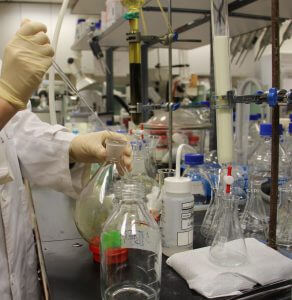Traditional Chinese medicine may offer possible cure for fatal Ebola
- 2015-01-10
Three plants extracts discovered to inhibit Ebola virus
A local expert in traditional Chinese medicine has identified three plant extracts that may have the potential to combat the deadly Ebola virus.
Associate Professor Zhang Hongjie and his team at the School of Chinese Medicine of Hong Kong Baptist University have found three plants that may contain anti-Ebola agents.
The expert in phytochemistry and drug discovery from natural resources says Ebola is considered a "blood heat" affliction in traditional Chinese medicine.
His team evaluated the anti-Ebola activity of selected active plant extracts and identified three plants, one found in Europe and two found in Hong Kong, as possibly containing anti-Ebola agents.
"All three plants have rich sources in Hong Kong and Mainland China. Two of them are available in all seasons. The cost to extract them should be cheap as they are common plants," said Professor Zhang.
However, Prof Zhang said it would be long time before the extracts could be used to tackle the disease as his team has not yet identified the active ingredients in the extracts.
"We need to seek more funding from the Hong Kong government to continue the research but apparently there is no funding opportunity available for us now," he said.

Prof Zhang and his team have collaborations with University of Illinois at Chicago to evaluate the anti-Ebola activity and are also trying to set up an anti-Ebola pseudo viral assay at Hong Kong Baptist University.
He said the government might not even know the existence of anti-Ebola drug discovery research programmes in Hong Kong, which results in the lack of funding. "People may think that the United States is the only country that has anti-Ebola research," he added.
Since the World Health Organization (WHO) declared the outbreak of Ebola Virus Disease (EVD) as an international concern in August, there have been growing concerns that it might spread from West Africa, where it originated, to other parts of the world.
Local authorities stepped up its precautionary measures only after a Hong Kong women returned from Kenya showing symptoms of the virus. Fortunately, the woman tested negative for the disease. But what if that wasn't the case?
Since the outbreak in March, the WHO has reported 14,413 cases of Ebola with 5,177 deaths in eight countries.
The fatality rate of EVD cases varies from 25 to 90 per cent in past outbreaks, depending on the strain. The virus causes severe immunosuppression and often leads to death by internal dehydration from the inability of the intestines to absorb water.
According to Prof Zhang, the distinctions between TCM and western medical treatments are the time needed to control the disease and the side effects caused by treatments. Western medical treatments usually target on a single purpose while TCM is multi-targeted.
Western medication directly attacks the virus and alleviates the symptoms. But TCM is aimed at curing the root cause of the disease by enhancing and mobilising the body's internal factors to improve the weak immune system's resistance to the virus.
Thus, TCM requires a longer curing period than western medical treatments to take effect on a patient''s illness. This makes TCM less effective in stopping the Ebola virus immediately after a person is infected.
"In addition to maintaining high alert for Ebola, Hong Kong people should as well be conscious to and re-examine personal health care to resist the virus strike."
-Dr Wong Nui-yiu, a registered Chinese practitioner
However, western medical treatment generally weakens one's immune system because it kills not only the virus but also normal cells, while TCM's plant treatment won't produce these side effects.
"Because of the different approaches of the two treatments, they should be used simultaneously to compensate each other's disadvantages,"said Prof Zhang when asked if it is possible to solely use TCM.
Prof Zhang describes EVD as "hard to track" and " hard to control" especially when it is spread to densely populated countries. The incubation period, that is, the time interval from infection with the virus to onset of symptoms, is two to 21 days. The disease has highest risk of spreading during this period as people carrying the virus may not know what they are infectious.
"In addition to maintaining high alert for Ebola, Hong Kong people should protect themselves against the virus by paying attention to personal health," says Dr Wong Nui-yiu, a registered Chinese medicine practitioner.
While we do not know when EDV may reach the city, Dr Wong says reinforcing one's vital essence and strengthening the primordial Qi, the most essential substance that makes up the body and maintains life activities is the key to improving the immune system so as to conquer communicable diseases.
By Yanis Chan
Edited by Nikki Wu
《The Young Reporter》
The Young Reporter (TYR) started as a newspaper in 1969. Today, it is published across multiple media platforms and updated constantly to bring the latest news and analyses to its readers.

Female racecar driver shines in motor car racing

Sun-kissed to Curb Weight and Diabetes, study finds




Comments